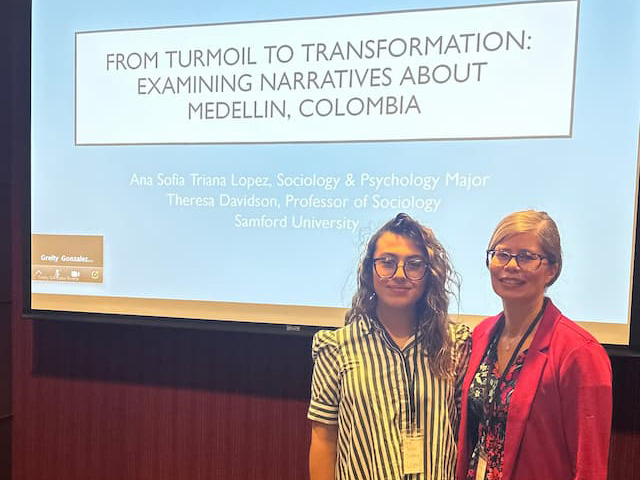
Ana Sofía Triana López, a sophomore psychology and sociology double major, presented a research paper she co-authored with Theresa Davidson, a professor of sociology, at the Midwest Association for Latin American Studies (MALAS) conference on Nov. 10–11, held at Samford University.
“Having the opportunity to present at the MALAS conference is one of my best experiences here at college,” López said. “Not only did I get to present at the conference, but I also got the amazing opportunity to hear fellow presentations on Latin America, allowing me to build professional connections for the future.”
This conference was a culmination of her participation in The Arts & Sciences Program for Independent Research (ASPIRE) last summer with Davidson. It’s a “one-on-one, faculty-guided research experience for undergraduates that draws upon their educational experiences, from introductory courses in writing and mathematics to specialized knowledge in their major fields.”
“Despite my lack of prior experience in research projects, Dr. Davidson's support and expertise were instrumental,” López said. “We were in constant contact throughout the summer and semester as we conducted the research. Not only did Dr. Davidson partner with me on our project but she also presented alongside me in the MALAS conference.”
“Presenting at MALAS was an enriching experience for both of us,” Davidson said. “This was Ana Sofía's first professional conference and my first time at MALAS. The session we presented was fascinating and humbling and inspiring to hear about the creative scholarship going on in the U.S. and abroad. Our project was well-received, generated important questions and discussions, and may even be something Ana Sofía continues to research as she moves forward in her academic career.”
Their research paper, “From Turmoil to Transformation: Examining Narratives about Medellín Colombia,” was inspired by Patricia Hill Collins' "Controlling Images" theory López learned in Davidson’s Race, Ethnicity and Social Justice course. It explores the various narratives surrounding black women in the media.
“I wanted to apply a similar approach to my own culture as an international student from Bogota, Colombia,” López said. “The ASPIRE grant provided the perfect opportunity to highlight and analyze my culture in a meaningful way.”
Davidson said, “We would not have been able to dedicate the time and energy to the project without the support of the ASPIRE grant. We are deeply grateful for the opportunities that ASPIRE provides for students and faculty.”
López and Davidson explored narratives and common negative stereotypes believed about Colombia. They used a mixed-methods approach, dividing the project into three main questions: how Colombia is represented in major news outlets in the United States, how people from Colombia view themselves and their country and what views people from the United States have about the country and its people.
“We analyzed two important online news sites, CNN and Fox News,” López explained. “Both sites had themes of violence and drug trafficking. Not surprisingly, the results were negative and showed Colombia in a bad light.”
To understand Colombians' views about themselves, they conducted a series of in-depth interviews.
López said, “The findings revealed a sort of different feelings and views about their country, having mostly positive attitudes but also having critical views, transcending stereotypic narratives about Colombia.”
López and Davidson also analyzed findings from a survey, examining attitudes and beliefs about Colombia to answer the last and final question of the research project.
“The results showed a general advocacy for negative stereotypes about Colombians, including drug trafficking and poverty,” López explained.
López expresses a heightened sense of readiness for graduate school and future endeavors following this experience.
“The ASPIRE program has been remarkably significant in my career, and I am truly grateful for the opportunity,” López said. “Working with Dr. Davidson was a wonderful experience. She was incredibly helpful and provided invaluable guidance throughout the entire research project, teaching me how to conduct and analyze data using different methodological approaches.”
“It was a joy to work with Ana Sofía on a project sparked by her love for her home country of Colombia,” Davidson said. “She led the project with her intellectual curiosity and passion for presenting Colombia in a more complex light.”
